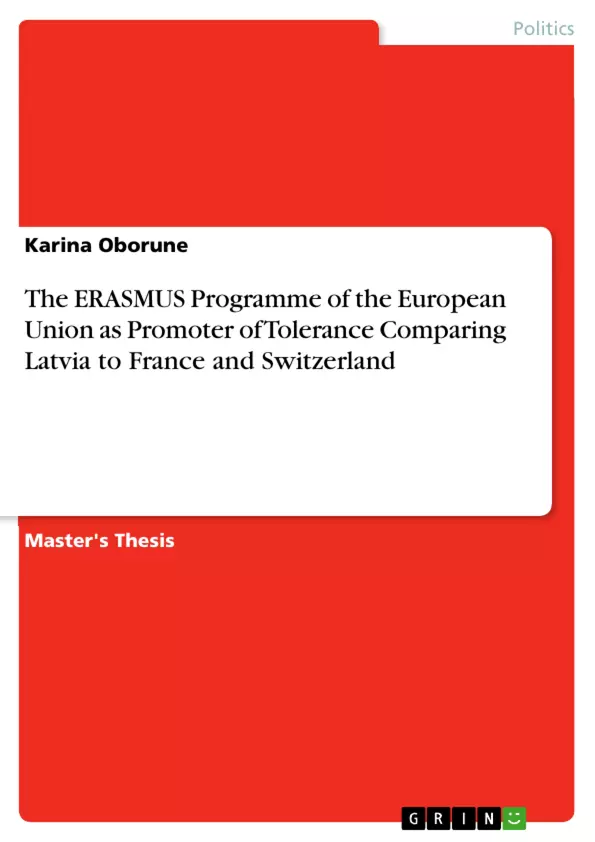Master thesis as one of the first such researches in Europe draws attention to the ERASMUS Programme – a successful example of European integration and a symbol of construction of European identity. Author has created definition of tolerance and through analysis of interviews with experts of the ERASMUS Programme and of tolerance has indicated that one of the Programme‟s objectives is the promotion of tolerance. Through analysis of questionnaires filled by respondents of University of Latvia, Science Po and ETH author has proved that the Programme promotes tolerance on the basis of encouraging multicultural experience, intercultural education, diminishing social distance, breaking stereotypes, furthering confidence and openness.
Inhaltsverzeichnis (Table of Contents)
- INTRODUCTION
- THEORETICAL (HISTORICAL) PART
- ANALYSIS OF THE ERASMUS PROGRAMME 1969-1987
- ANALYSIS OF THE ERASMUS PROGRAMME 1987-2009
- THEORETICAL (CONCEPTUAL) PART
- CONCEPT OF TOLERANCE
- FACTORS, CRITERIA AND INDICATORS OF TOLERANCE
- INTERCULTURAL EDUCATION
- SOCIAL DISTANCE
- STEREOTYPES AND PREJUDICES
- EMPYRICAL PART
- SURVEY
- METHODOLOGY
- RESULTS
- ANALYSIS
- INTERVIEWS
- METHODOLOGY
- RESULTS
- ANALYSIS
- CONCLUSION
Zielsetzung und Themenschwerpunkte (Objectives and Key Themes)
This master thesis aims to analyze the European Union's ERASMUS Programme as a promoter of tolerance, comparing Latvia to France and Switzerland. The thesis utilizes a combination of historical and conceptual frameworks to understand the ERASMUS Programme's evolution and its impact on fostering tolerance. The research includes interviews with experts on both the ERASMUS Programme and tolerance, along with a survey of students from the University of Latvia, Science Po, and ETH.
- The impact of the ERASMUS Programme on promoting tolerance
- The influence of multicultural experiences and intercultural education on tolerance
- The role of social distance in shaping perceptions of tolerance
- The impact of stereotypes and prejudices on tolerance
- The contribution of the ERASMUS Programme to European integration and identity
Zusammenfassung der Kapitel (Chapter Summaries)
The thesis begins with a historical analysis of the ERASMUS Programme from its inception in 1969 until 2009. This historical overview provides context for the program's development and its objectives. The theoretical part delves into the concept of tolerance, exploring key factors, criteria, and indicators. This section also examines the role of intercultural education and social distance in promoting or hindering tolerance. The empirical part focuses on the findings of a survey conducted among students from Latvia, France, and Switzerland, as well as interviews with experts. These data are analyzed to assess the impact of the ERASMUS Programme on promoting tolerance and its role in intercultural understanding.
Schlüsselwörter (Keywords)
The central themes explored in this thesis include the ERASMUS Programme, tolerance, European integration, intercultural education, social distance, multicultural experiences, stereotypes, and prejudices. The research draws upon empirical data from surveys and interviews, focusing on the experiences of students and experts in Latvia, France, and Switzerland. It aims to contribute to the understanding of the ERASMUS Programme's role as a promoter of tolerance within the European Union.
- Arbeit zitieren
- Karina Oborune (Autor:in), 2009, The ERASMUS Programme of the European Union as Promoter of Tolerance Comparing Latvia to France and Switzerland, München, GRIN Verlag, https://www.hausarbeiten.de/document/150617


